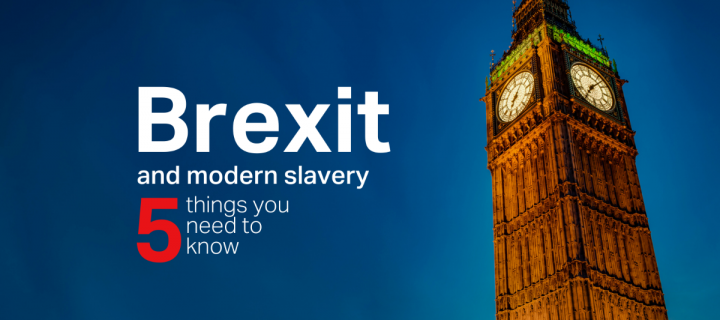
1 NEW BORDER CONTROLS WILL NOT NECESSARILY CUT TRAFFICKING
It is a misconception that all victims of trafficking and modern slavery are migrants.
Many of the vulnerable people we deal with at Unseen are UK citizens, and many of those who are not from the UK were originally here legitimately.
It is also a misconception that our pre-Brexit open borders allowed migrants to be trafficked and exploited easily.
In fact, post-Brexit, the UK no longer has real-time access to European security systems, meaning there will be a downgrading of UK Border Force’s capability to intercept traffickers.
2 FAILING TO SPOT THE SIGNS OF EXPLOITATION
Our country’s hostile immigration environment means the authorities are failing to identify some victims of modern slavery. Their focus is on a person’s right to be in the UK rather than spotting the signs of exploitation.
This situation could get worse in a post-Brexit climate with increased restrictions on movement from the EU.
It could also make it easier for traffickers to discourage victims from seeking help. A potential victim does not want to risk being deported.
Meanwhile, those with no status or who remain in the UK on expired visas are also more vulnerable to exploitation because they have nowhere to turn when things don’t go to plan.
3 RIGHT TO REMAIN – AN UNCERTAIN FUTURE
Victims of modern slavery who are identified in the UK no longer have the right to remain upon leaving the support of the National Referral Mechanism (NRM – the Government’s system for supporting victims of modern slavery).
This means they are more susceptible to re-trafficking and re-exploitation because they are likely to be sent back to where they were trafficked or exploited in the first place, without any form of risk assessment.
There is a risk that more survivors go underground to avoid being sent back to their home country. This makes them an ideal candidate for exploitation as exploiters will target them knowing they cannot raise the flag with authorities for fear of deportation.
4 MORE VULNERABLE WORKERS
The ending of freedom of movement for EU citizens will have a direct impact on sectors vulnerable to exploitation.
This is especially true in many factories, distribution centres, farms, hospitality venues, and the food and apparel sectors, which rely on low-paid, low-skilled labour from migrant workers and will still have to source staff from somewhere.
As the pressure on businesses increases to find alternative low-skilled labour, so does the risk of UK workers being exploited: companies might fail to apply due diligence when the pressure to meet high demand ramps up.
5 COVID ONLY MAKES MATTERS WORSE
The timing of us leaving the European Union could not be worse for potential victims of modern slavery.
Our experience shows that the risk of exploitation increases in times of significant economic downturn – like the current Covid-induced slump.
UK workers are already facing an uncertain future with job losses and health concerns brought on by the pandemic. Such a climate only makes them more vulnerable.
As operators of the UK wide Modern Slavery and Exploitation Helpline, Unseen is working at the coal face, receiving reports about slavery and exploitation on a daily basis.
Through the data we gather, we will monitor the impact of Brexit over time, and try to spot any trends to better understand what is happening.
We will then share relevant information across other organisations and agencies we work with. And we’ll continue working with our partner businesses on identifying issues in their supply chains and operations.
By doing this, and with the continued backing of our supporters, we can help prevent slavery and exploitation from occurring in the first place.
Find out how we work with businesses to prevent modern slavery.


